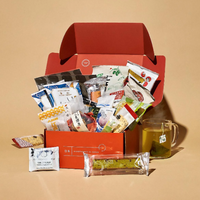Japanese Tea Masters And What It Takes To Become One
Tea has been a classic drink in Japan for ages. While it has taken on a lot of modern remixes, like the rising fame of matcha that we all love today, the story tea itself is one of the oldest stories there is. The earliest known references to tea were made all the way back in the 8th century in ancient Japanese texts. In Japan, tea started out as a drink for the religious classes as Japanese priests on missions to China brought tea home. In the following centuries, its reach expanded, ultimately becoming a staple drink for all walks of life. Moreover, many facets of Japanese culture formed around tea and foods to eat alongside tea, especially after sencha tea was created in the 18th century. Specifically, tea ceremonies became central to tea culture in Japan.

The Japanese tea ceremony, known as sadō or chadō in Japanese, is a traditional activity involving the preparation and consumption of green tea, like matcha or sencha. There are two main families of tea ceremonies in Japan, the informal gathering, called chakai, and the formal gathering, called chaji. While both aim to highlight the hospitality of the host, they differ in length and complexity. Chakai is a smaller gathering featuring a tea brewing and small, light snacks. A chaji is a very formal event that includes a multi-course meal, called kaiseki, paired with multiple teas and confections. This type of ceremony can last up to four hours!
With tea ceremonies come tea masters. As Food & Wine explains, “a tea master is to tea what a sommelier is to wine: an expert who can identify the drink's origin, aromas, mouthfeel, and much more.” Tea masters know tea like the back of their hand; they know teas’ characteristics, can pair food perfectly with different brews, and perform tea ceremonies. Throughout Japanese history, there have been numerous famous tea masters. Murata Shuko is considered the father of the “Way of Tea” and was the first to design a building devoted entirely to tea ceremonies. Tea master Sen Rikyū established the ceremony procedures, fully elevating the practice to an art form. He outlined the proper utensils to use, the teahouse architecture, the guidelines for landscaping the teahouse grounds, and the steps of the ceremony.
Becoming a tea master takes time and dedication. You learn everything from the flavor profiles of teas, the best way to prepare different brews, and have hands-on experience at tea estates where the leaves are being grown and cultivated. Institutions like the Global Japanese Tea Association and the International Tea Masters Association offer complete training courses but are also currently offering virtual classes you can take from anywhere!
While you are on your way to tea mastery, Bokksu has a great selection of teas to get you started. On the marketplace, you can find everything from green teas to black teas and herbal teas. If you do not know where to start, head to the Traditional Japanese Tea Bundle. This set includes five traditional green teas, including sencha, ryokucha, hojicha, and kukicha. Alternatively, you can put together your own selection of teas by browsing our single serve-bags and loose-leaf packets, including Higa Granny’s Sanpin Cha Jasmine Tea, Ginger & Yuzu Herbal Tea, and the Sasumarché Kagoshima Black Tea. Then, when you are ready, you can try your hand at a tea ceremony of your very own with the Ceremonial-Grade Matcha: Unryu, derived from the prestigious Uji regions, which is known for its matcha production. Combine this matcha with the Ceremonial Matcha Tea Starter Set, and you will ready to go. This kit comes with traditional teaware like a ceramic mixing tea bowl (called chawan), a bamboo tea whisk (called chasen), a tea scoop (called chashaku), and a matcha powder container (called natsume).
So there you have it, we have laid out what you need to begin building your knowledge of tea. The tea culture in Japan is rich and immersive, so even if you just experiment a bit with the art, there is so much to learn and experience. As you are probably already aware, if you are familiar with us, we love tea in all forms, whether it is a calming hot brew to stave off a cold day or a refreshing, icy refreshment in the middle of the summer. We are so excited to start you on your path towards becoming a tea master; make sure to invite us to your future tea ceremonies!Author Bio











